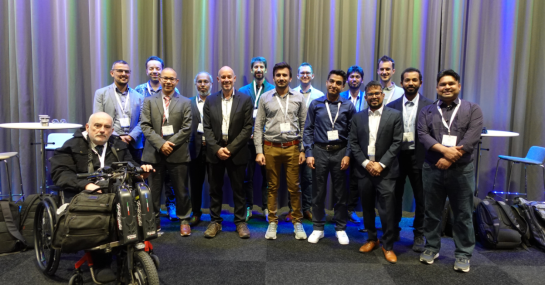
From 11 to 15 June 2023, the 38th International Electric Vehicle Symposium (EVS38) took place in Gothenburg, Sweden — a key global platform where researchers, industry experts, and policymakers gather to present recent advances and discuss the technical, economic, and societal challenges of electromobility. The MOBI Electromobility Research Group from Vrije Universiteit Brussel was prominently represented, with 18 researchers attending in person.
MOBI’s Impact at EVS38
Our team delivered five oral presentations, showcased five posters, organised one workshop, contributed to a panel session, and chaired over six scientific sessions. This strong presence highlights MOBI’s role as a leading contributor to international electromobility research and demonstrates our ongoing commitment to advancing knowledge and fostering multidisciplinary dialogue.
A Decade of Growing Focus on Charging Infrastructure
Prof. Joeri Van Mierlo, head of MOBI, observed a notable shift in research priorities over the past decade:
“The number of scientific articles on charging infrastructure has almost doubled in ten years — rising from 17% at EVS30 in 2017 to more than 30% at EVS38.”
This trend underscores the growing importance the academic community places on addressing one of the sector’s most urgent challenges: deploying and optimising efficient, scalable charging systems.
Grid Integration and Market Mechanisms
Prof. Cedric De Cauwer highlighted the increasing interest in how electric vehicles interact with the electricity grid:
“The integration of electric vehicles into the electricity grid is attracting more attention, as seen in sessions on smart charging, vehicle-to-grid (V2G), and smart grids. MOBI has contributed significantly to this field through research on charging scheduling algorithms for imbalance markets.”
This systemic view — seeing vehicles not as isolated units but as part of a broader energy ecosystem — is becoming central to academic and industrial discussions alike.
Multidisciplinary Dialogue and Scientific Exchange
Prof. Sazzad Hosen reflected on the diversity of topics and formats at EVS38:
“EVS38 brought together experts from across the globe to tackle current electromobility challenges. Battery-related sessions sparked lively discussions ranging from materials science to market studies. It was an exciting and well-organised event.”
Such multidisciplinary interaction — from fundamental science to applied policy — is essential to navigating the complex transition to electromobility.
Technological Innovation and Strategic Direction
Prof. Omar Hegazy noted a strong emphasis on rapidly emerging technologies and system-level innovation:
“EVS38 showcased well-structured and strategically important developments in electrification and the energy transition — from high-power charging systems like Megawatt Charging Systems (MCS) to V2X technologies and OEM strategies. Together, we can drive impactful innovations for next-generation EVs and charging infrastructure.”
He also suggested that future editions could enhance connections between poster presentations and the exhibition area, strengthening the link between academic research and industrial application.
Looking Ahead to EVS39 in Long Beach
EVS38 reaffirmed the vital role of scientific research in guiding the technological and systemic evolution of electromobility. Research groups like MOBI continue to contribute not only through peer-reviewed publications but also by supporting innovation and informing policy frameworks.
As a mirror on display at the exhibition put it — “Objects in mirror are closer than they appear” — many challenges once seen as long-term are now directly ahead.
With this in mind, MOBI is already preparing for EVS39, scheduled from 21 to 24 June 2026 in Long Beach, California. Building on the momentum of previous editions, EVS39 promises to further global dialogue on electromobility, and MOBI looks forward to sharing new insights and research that support the sustainable advancement of this field.
Van den Steen Nikolaas - A persona based TCO analysis of speed pedelecs and carsharing as a holistic mobility solution
- Naghdizadegan Jahromi Saeed - Scheduling Electric Vehicles Charging for Participation in Imbalance Market Using Model-Free Reinforcement Learning
- Dalir Amin - Efficient Charging Strategy in Megawatt Charging Station Using Model Predictive Control: Balancing Cooling Energy and Charging Current for Heavy-Duty Battery Electric Vehicles
- Hosen Md Sazzad - A data-driven approach to map the aging of dismantled commercial high-energy NMC cells
- Van Den Bossche Peter - Stan4SWAP: towards efficient standards for Light Electric Vehicles Battery Swap
- Hasan Mohammed Mahedi - Eco-driving Optimization using Digital Twins of EV Powertrain
- Jaman Shahid - Interoperable Multiport DC Charging System with Optimal Charging Management Strategy for Electric Vehicle Fleet Charging Hub
- Raza Kashif - Characterization of High-Energy Prismatic NMC (631) Cells: A Combined Incremental Capacity and Electrochemical Impedance Spectroscopy Approach
- Peña Robert Alfie S. - V2X Scenarios Analysis for Future-Proof Battery Management Systems
- Sakib Md Iftadul Islam - Electro-Thermal Performance Assessment and EMI Characteristics of Post-800V Traction Inverters for EV Applications
